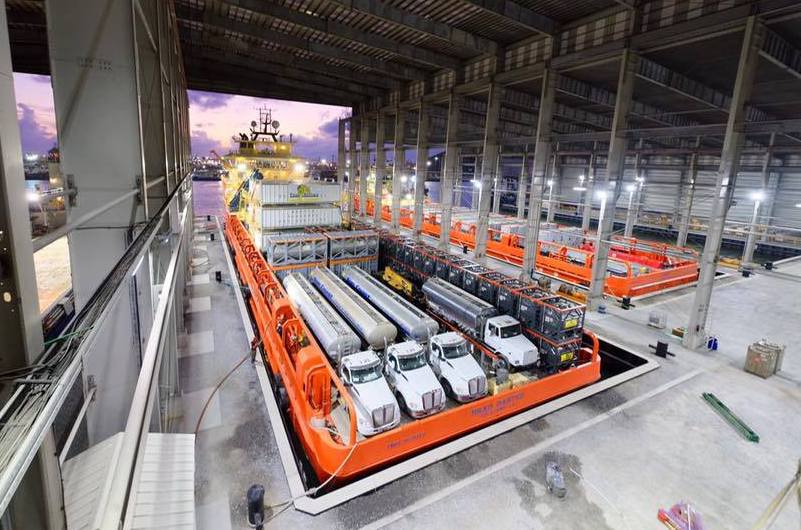A picture posted on social media showing the Edison Chouest Offshore OSV loaded with tanker trucks, generators and other supplies bound for the Caribbean. Photo via Facebook
Dozens of U.S.-flagged offshore supply vessels are ready and waiting to assist in the humanitarian relief efforts in Puerto Rico and the U.S. Virgin Islands if they are called on to do so by the Trump Administration.
Last week, Louisiana Senator Bill Cassidy, MD met with President Donald Trump to discuss a host of issues, including a letter which he sent to the President outlining the availability and readiness of U.S. offshore supply vessels (OSVs) based in Louisiana for support in Puerto Rico.
“As the United States continues relief efforts, I ask that you please consider U.S. flagged offshore supply vessels in Louisiana whose owners have informed me that they are ready and available to provide all necessary support to the people of Puerto Rico,” Senator Cassidy wrote in the letter.
“The ships are docked in Louisiana, are fully self-sufficient, can include meals, have sleeping capacity and laundry service for accommodated persons and can be in Puerto Rico in a few days. They can and are willing to do whatever is needed to help in this crisis. We know from previous experience that disasters such as this require an “all hands on deck” approach. Louisianans have witnessed the generosity of others and are prepared to do the same for the people of Puerto Rico,” the letter stated.
Senator Cassidy’s appeal comes amid the Department of Homeland Security’s temporary 10-day waiver of the Jones Act, which the DHS justified by saying it will ensure that all options are available to move and distribute goods to Puerto Rico in the aftermath of Hurricane Maria. The blanket waiver allows foreign vessels to move cargo from the U.S. mainland to Puerto Rico as is normally prohibited by the Jones Act.
The domestic maritime industry has been firmly against the waiver since the onset, arguing that relief efforts have in no way been hampered or slowed due to Jones Act vessel availability, rather on-island distribution has been the main issue in getting supplies Americans in need.
“If a Jones Act waiver was needed, we would not be opposed. But in this case, it is not needed,” Jacksonville-based Crowley Maritime Corporation said following the signing of the waiver last week. Crowley is one of three main ocean carriers serving the Jones Act U.S. mainland to San Juan, Puerto Rico trade along with Tote and Trailer Bridge.
Although waiver requests can be hard to track, as of Tuesday both Crowley and Tote said that they were unaware of any foreign vessels that have been booked to transport cargo from the U.S. mainland to Puerto Rico under the waiver. Crowley and Tote also operate two of the three marine terminals in Puerto Rico’s main port of San Juan.
Aaron Smith, President and CEO of the Offshore Marine Service Association (OMSA), which represents offshore marine transportation industry interests in the United States, said he “wholeheartedly believes” there is sufficient capacity within the U.S. domestic fleet to provide the needed aid to Puerto Rico.
While OMSA member vessels do not traditionally sail to Puerto Rico, Smith said a poll of members showed that there are currently 70 offshore supply vessels that are available and could be used to assist in the relief efforts if needed.
These vessels could provide a combined deck capacity of more than 161,000 tons, accommodation for 2,079 response workers or government employees, and fuel transportation and transfer capability exceeding 20 million gallons, according to OMSA. In addition, there are 59 OSVs with drinking water capacity of 11,652,797 gallons (an amount equal to 75 million 20 oz. water bottles), and 24 OSV/Liftboats with cranes to offload cargo from a container ship or container barge in a port that lacks working container cranes, OMSA said.
“All of these vessels are ready to go now and are in addition to the handful of OSVs that are already providing assistance to our fellow Americans in Puerto Rico,” Smith said in a statement to gCaptain. “Going forward, we look forward to working with our friends in the Coast Guard to ensure there are not regulatory road blocks which would prohibit other U.S.-flag vessels from participating in these relief efforts,” he added.
It seems that the domestic offshore industry’s offers to assist have not gone completely unnoticed.
Earlier Wednesday, Seattle-based Foss Maritime said it has been contracted by FEMA to send three vessels to Puerto Rico and the U.S. Virgin Islands serve as floating hotels for approximately 729 people. In addition, we are told there are as many as eight other offshore vessels that have been sent to assist with the relief efforts, although we have not been able to verify that number independently. It is also not clear if those vessels were contracted by FEMA or some other non-governmental organization sending relief aid to hurricane-hit areas.
A photo circulating on Facebook on Tuesday showed an Edison Chouest Offshore vessel loaded with trucks and other supplies reportedly bound for the Caribbean. Last month, the ECO vessel Roger White was chartered by the humanitarian nonprofit group Convoy of Hope to bring supplies and 3 million meals to the British Virgin Islands following Hurricane Irma, according to the group’s Facebook page.
The Merchant Marine Act of 1920, aka the Jones Act, is a federal law requiring goods shipping between two ports in the United States be carried on American-built ships that are mostly owned and crewed by American citizens. The law applies to ships transporting goods between the U.S. mainland and Puerto Rico among other islands and territories, but it does not apply to the U.S. Virgin Islands.
Since Hurricane Maria hit Puerto Rico as a Category 4 hurricane on September 20, a steady stream of U.S and foreign ships deployed on international trade lanes have been arriving in Puerto Rico with fuel and supplies. Despite some claims to the contrary in the media, Puerto Rico actually receives the vast majority of its petroleum fuel imports from foreign markets via internationally-trading tankers.
The current Jones Act waiver is due to expire Sept. 7 at midnight unless it is extended.

 Join The Club
Join The Club











